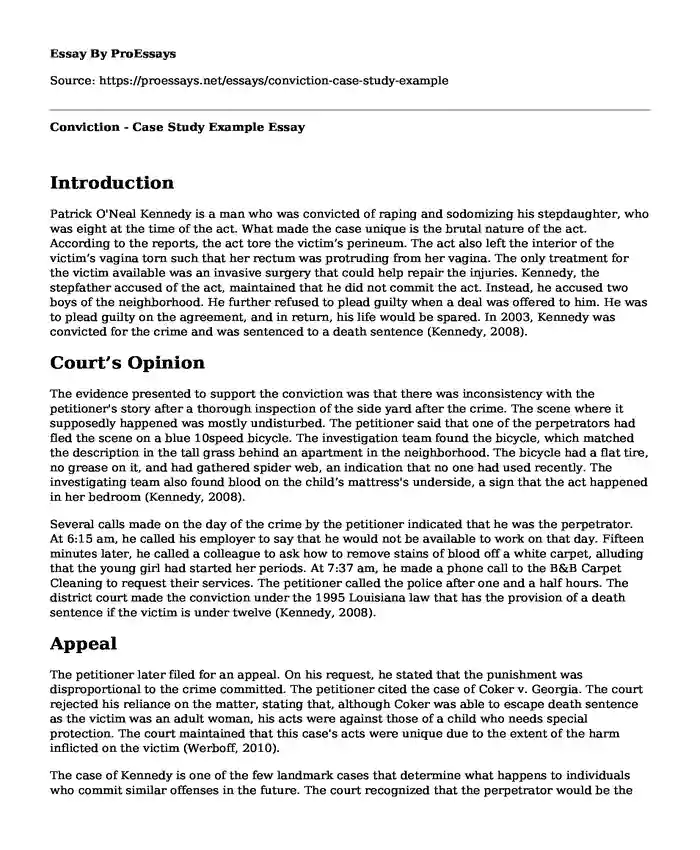Introduction
Patrick O'Neal Kennedy is a man who was convicted of raping and sodomizing his stepdaughter, who was eight at the time of the act. What made the case unique is the brutal nature of the act. According to the reports, the act tore the victim’s perineum. The act also left the interior of the victim’s vagina torn such that her rectum was protruding from her vagina. The only treatment for the victim available was an invasive surgery that could help repair the injuries. Kennedy, the stepfather accused of the act, maintained that he did not commit the act. Instead, he accused two boys of the neighborhood. He further refused to plead guilty when a deal was offered to him. He was to plead guilty on the agreement, and in return, his life would be spared. In 2003, Kennedy was convicted for the crime and was sentenced to a death sentence (Kennedy, 2008).
Court’s Opinion
The evidence presented to support the conviction was that there was inconsistency with the petitioner's story after a thorough inspection of the side yard after the crime. The scene where it supposedly happened was mostly undisturbed. The petitioner said that one of the perpetrators had fled the scene on a blue 10speed bicycle. The investigation team found the bicycle, which matched the description in the tall grass behind an apartment in the neighborhood. The bicycle had a flat tire, no grease on it, and had gathered spider web, an indication that no one had used recently. The investigating team also found blood on the child’s mattress's underside, a sign that the act happened in her bedroom (Kennedy, 2008).
Several calls made on the day of the crime by the petitioner indicated that he was the perpetrator. At 6:15 am, he called his employer to say that he would not be available to work on that day. Fifteen minutes later, he called a colleague to ask how to remove stains of blood off a white carpet, alluding that the young girl had started her periods. At 7:37 am, he made a phone call to the B&B Carpet Cleaning to request their services. The petitioner called the police after one and a half hours. The district court made the conviction under the 1995 Louisiana law that has the provision of a death sentence if the victim is under twelve (Kennedy, 2008).
Appeal
The petitioner later filed for an appeal. On his request, he stated that the punishment was disproportional to the crime committed. The petitioner cited the case of Coker v. Georgia. The court rejected his reliance on the matter, stating that, although Coker was able to escape death sentence as the victim was an adult woman, his acts were against those of a child who needs special protection. The court maintained that this case's acts were unique due to the extent of the harm inflicted on the victim (Werboff, 2010).
The case of Kennedy is one of the few landmark cases that determine what happens to individuals who commit similar offenses in the future. The court recognized that the perpetrator would be the first to receive the harsh punishment for raping a child since the amendment in 1995 (Werboff, 2010).
However, the punishment brought a series of issues that formed part of the discussion during the 2008 presidential campaigns. Both candidates agreed that acts of this kind against a child are to be punished with capital punishment. The decision was, however, unconstitutional. The court stated that Louisiana did not have the right to impose capital punishment as directed by the constitution.
In the argument, the court stated that since the perpetrator raped the victim and did not kill her or intend to do so, the punishment was unproportioned. It noted that capital punishment was only allowed if victims were raped and killed or if the perpetrator had intentions of doing so. In this case, the perpetrator had no intension of killing the victim. The court reviewed the death penalty history for perpetrators involved in raping a child in the country, and further argued that there was a national consensus contrary to this form of punishment for a similar crime.
The court, in its independent judgment, concluded that capital punishment was unproportioned for crimes like rape against a child citing the United States Constitution amendments VIII and XIV. The decision was consistent with the argument presented to justify the punishment for the crime of raping children. Consequently, the Supreme Court of Louisiana ordered a resentencing of the case at the district court. On January 7, 2009, Kennedy was sentenced to life imprisonment without parole. The sentence became the mandatory punishment for rape crime against a child (Werboff, 2010).
Conclusion
In conclusion, the case of Kennedy v. Louisiana, 128 s. Ct. 2641 (2008) became the one case to determine what happens to perpetrators who rape children under the age of 12 in the U.S. While this may be the case, the decision by the court was felt to have undermined the rule of the state.
References
Kennedy. (2008, October 1). KENNEDY v. LOUISIANA. Legal Information Institute. https://www.law.cornell.edu/supct/html/07-343.ZO.html.
Werboff, S. (2010, December 15). Halting The Sudden Descent into Brutality: How Kennedy v. Louisiana Presents a More Restrained Death Penalty Jurisprudence. Law clark.edu.
https://www.lclark.edu/live/files/7241-lcb144art12werboffpdf.
Cite this page
Conviction - Case Study Example. (2024, Jan 01). Retrieved from https://proessays.net/essays/conviction-case-study-example
If you are the original author of this essay and no longer wish to have it published on the ProEssays website, please click below to request its removal:
- "Letter from Birmingham Jail" By Martin Luther King: Critical Essay
- Essay Sample on Women's Movement
- Essay Sample on Substance Abuse: A Growing Problem Affecting Young People
- Essay on Counselors Helping Battered Women to Overcome Career Challenges
- Essay Sample on Italian Immigration to California: Impact on Music 1880-1924
- Trump Immigration: Resistance to Deportation & Public Concern - Essay Sample
- Eating Disorders: Anorexia, Bulimia, Binge Eating & Body Dysmorphic Disorder - Essay Sample







